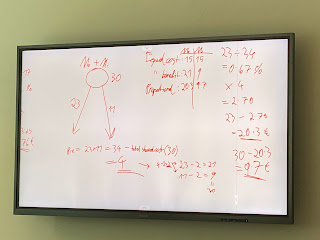World Politics Session 5 and 6
In the first session of class, we started with a conversation of Bush's slip up in a recent speech. Then, we started with a different form of government systems and the different types of government under each systems. Direct democracy would be Switzerland as an example. You vote for two things directly: on government and laws. For representative democracy, the people votes for representatives who then vote on policy initiatives, but the people has no say in the political decision processes between elections. What the people can do is evaluate who you voted for and you can protest and voice your concern. Presidential democracy, head of the government is the president and his cabinet. Individuals elect representatives in a Republic and the representatives would elect the president. A republic can be a democracy or a dictatorship. The absolute and the constitutional monarchy is either one King or Queen rules the country and the other is when the Head of State if the royal family and they rule along with a constitutionally organized government. Aristocracy states that the highest class in certain societies, typically comprising people of noble birth holding hereditary titles and offices. Plutocracy is a government by the wealthy. Kleptocracy is a government whose corrupt leaders, kleptocrats, use political power to appropriate the wealth of the people and land they govern, typically by embezzling or misappropriating government. An oligarchy is a small group of people having control of a country or organization. Theocracy is a system of government in which priests rule in the name of God or a god—the guy who is ruling (interprets) and makes the law. Communism is a an economic ideology that advocates for a classless society in which all property and wealth are communally-owned, instead of by individuals—usually ruled by one party. Dictatorship is governed by a dictator, which can be both civilian or military. We discussed that with the current situation between Russia and Ukraine, Russia would be constructivists and realists in their approach and reasoning for the invasion, while Ukraine are leaning towards liberalist.
What is the role of the US? Liberalist, Constructivists or Realist? A combination? Arguments, scenarios and outcomes? Factors influencing their position and their reaction towards Ukraine and Russia? External and internal influences, enermies and allies? Midterm elections, oil embargo, regime change. Why the US isn’t pressuring India to put sanctions on Russia.
Interests: Oil/resources, defending Ukraine from Russia, opportunities and chances in Russia (cheap money), the Allies expecting something (they wanna feel protected since they pay a lot).
The US is a mixture, they have the liberal element from their global influence and they are a realist in terms of their national interests such as (in Ukraine: externally, there are allies watching over them and their reaction to the invasion, it is important for them to show that they are involved for the sake of their allies when they are in trouble, to also show China, Iran and North Korea, that their sanctions and reactions to Russia is a potential reaction to China if they threaten the US allies and the US itself), (Internally, the midterms and the elections are important for the incumbent, could be about foreign policies, supporting Ukraine is a part of the Democratic Party’ principles) constructivist in the term of seeing itself as the defender of democracy and liberalism, thus, their motive to be involved in Ukraine is to be the defender of democracy.
Why the US is not pressuring India: Russia and India are best economic partners, Russia sells it at a very cheap price and in the meantime, India sells other produce like tea and such. The US understands that because its unrealistic to put pressure on India. They might lose India in the process.

Comments
Post a Comment